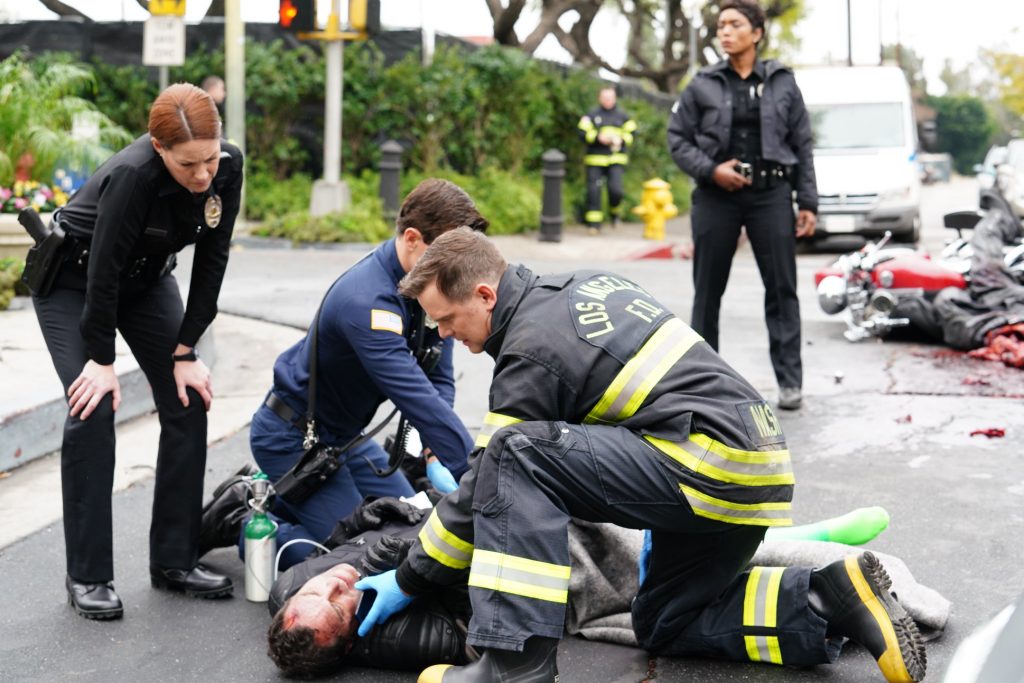Get the help you need right now 855-900-8437 Get Help Now
Get the help you need right now 855-900-8437 Get Help Now
March 7, 2018
FOX’s new procedural drama, “9-1-1,” aims to depict the visceral, in-the-moment action in the daily lives of fire fighters, police and call center representatives. While the show creators and cast spent a significant amount of time with real fire fighters and paramedics in preparing for the show, “9-1-1” is not as true-to-life as it could be, according to fire fighters, paramedics and other first responders who have noted the inaccuracies inherent in January’s latest series.
Some say their day-to-day activities are vastly different. Clearly, “9-1-1” is not meant to be a documentary, and it strays from the truth in many ways for theatrical effect. While Hollywood’s spin will never truly match the real-life experiences of fire fighters, one aspect of the show seems promising: one character, in particular, is as real as any fire fighter.
Fire Captain Bobby Nash (Peter Krause) is a seasoned fire fighter. He’s a dedicated leader, but inside he’s struggling while in recovery from drug and alcohol abuse. To avoid forgetting “… how easy it is … to end up on the wrong path,” Bobby goes to confession every week. “There are things that he has to deal with, but he needs a [on/off] switch so he can go to work and forget about the things that haunt him,” says show creator Ryan Murphy.
In “9-1-1” Bobby talks with a priest who acknowledges the challenges of the fire fighting profession. Equally exhausted and resolute, Bobby says, “The only way to survive is to find a way to cope with the ones you lose. Some drink, some do drugs, some gamble, some are sex addicts.” Bobby knows all too well that trauma requires an escape route, and that some coping mechanisms can be lethal. Unfortunately, this is one aspect of “9-1-1” that isn’t fictional.

In the FOX drama, Bobby’s struggles with addiction and recovery, and he resists coming to terms with or talking openly about his condition.
While “9-1-1” takes many creative liberties in depicting the real life of fire fighters, this is one aspect that is captured accurately. Most fire fighters are not natural-born outspoken advocates for mental health. In fact, they are often the opposite: unwilling to open up much, if at all. Within the fire-fighting profession, unspoken stigmas exist, and invisible rules prevent fire fighters from speaking up about PTSD and depression, drinking problems or drug use.
The reality is, 92 percent of fire fighters say stigma is a barrier to seeking help; many men and women in the fire service would rather run head-on into the face of physical danger than deal with emotional trauma.
Thus, the weight of PTSD and other behavioral health problems become a burden that too many fire fighters and paramedics bear in silence. But keeping quiet can have severe consequences. If left untreated, PTSD and depression can cause fire fighters to isolate themselves, become increasingly irritable and can even snowball into suicidal ideation. Fire fighters with a drug or alcohol addiction can lash out at their peers, show up late to work, shirk duties, or worse, put lives in danger.
Staying silent about PTSD can be toxic, especially over time. In one scene, Buck (Oliver Stark), a young fire fighter, struggles to cope with the trauma he’s experienced. Looking to his father figure in the fire service, he asks Bobby about the first time he lost someone. Bobby recalls every detail of the day and the person he couldn’t save, down to the smiley faces on the woman’s shoes. Sharing a truth he’s learned over many hard years in the fire service, Bobby tells a distraught Buck, “… anybody who tells you that losing someone doesn’t affect them is lying.”
Bobby knows full well that his own coping mechanisms, namely drinking, could mean his downfall. While he might choose alternative methods of coping with the horrors he’s seen over the years, he doesn’t want Buck to follow suit. “I’m glad you can’t flip that switch,” Bobby says solemnly, watching Buck suffer. “I don’t want you to. It’s not going to make you a better fire fighter.” Like a father who doesn’t want his son to repeat his mistakes, Bobby tells Buck it’s important to open up to someone who can help. Handing Buck a mental health professional’s card, Bobby says, “We have people at the department who help us deal with this kind of stuff. You don’t have to talk to me, but you do have to talk to someone.”
As “9-1-1” evolves, Bobby’s experiences will continue to unfold. But his story is not unique. As a fire fighter or paramedic, this scene might feel familiar, or maybe you wish you had the opportunity to pass along this kind of advice to someone in your firehouse. If you’re an IAFF member struggling with PTSD or addiction, or know someone on your team who might be, there are resources to help you start the conversation that could lead to getting real help.
At the IAFF Center of Excellence, we’re here to listen and help you find recovery. Our Center is the first of its kind, treating mental health issues such as PTSD, with or without co-occurring addiction. Designed exclusively for IAFF members, you will be among your brothers and sisters, and be empowered to find healing for the long term. Don’t stay silent about your struggles — call the IAFF Center of Excellence for a free and confidential conversation. There’s no obligation to commit to treatment. Your recovery is possible. Call today to learn more.